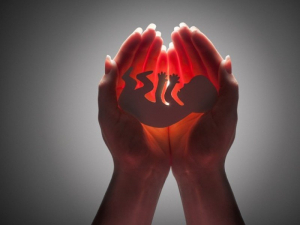Unfortunately, not all pregnancies end happily. In some cases, for reasons that remain largely unknown, the fetus dies in the first weeks of pregnancy.
The term "spontaneous abortion" or " miscarriage " refers to the death of a fetus before twenty weeks of pregnancy. If death occurs later in pregnancy, it is called stillbirth or intrauterine death. Sometimes miscarriage occurs at such an early stage. period, that the associated blood loss can be mistaken for normal menstruation.
Why does miscarriage occur?
As we have already mentioned, it is not always possible to track the causes of miscarriage. The most common of these are chromosomal abnormalities. Most spontaneous abortions (about 80%) occur during the first 10-11 weeks of pregnancy. 50% of these miscarriages are caused by errors in gametogenesis, i.e. the process that leads to the formation of gametes, male and female reproductive cells.
Another cause is blood clotting problems such as antiphospholipid antibody syndrome, which is an autoimmune and multifactorial disease that causes both venous and arterial thrombosis.
Spontaneous abortion is often caused by defects in the luteal phase, that is, the phase following ovulation. In this case, a deficiency of progesterone is determined - the main hormone at the initial stage of pregnancy (up to the fifth week).
What are the risk factors?
In addition to the reasons just discussed, there are some health conditions of the parents that can affect the development of the fetus and the subsequent course of pregnancy. Research on the subject confirms the link between these risk factors and higher abortion rates.
Here are a number of cases in which pregnancy may be at risk: the pregnant woman is over thirty-five years old; some chronic diseases that have not been treated or neglected before, such as diabetes, thyroid disorders, systemic lupus erythematosus, arterial hypertension, infections.
What happens in case of miscarriage?
Diagnosis is made using clinical and imaging studies. This means that if a woman has had a miscarriage, which usually manifests itself in blood loss and possibly convulsions, a gynecological examination and ultrasound will be performed. In fact, a distinction is made between complete and incomplete spontaneous abortion. In a complete miscarriage, all the material is excreted naturally as a result of blood loss. In an incomplete abortion, some biomaterial may remain in the uterus. To facilitate its expulsion, medications are used or curettage is performed.
How to survive a spontaneous abortion?
In most cases, miscarriage does not have a clear and definitive cause, which can be disorienting for families experiencing it. However, it is important to keep in mind that this is far from a rare occurrence. So the first rule is not to ignore or avoid the topic. Like all losses, this is a loss that must be respected.
Pretending that nothing happened, of course, does not help; on the contrary, it only worsens the pain of those who are experiencing it. In fact, expectant parents may be instilled with feelings such as disappointment due to a failed pregnancy by well-wishers around them. This is, of course, a terrible and inexplicable pain, but recognizing it is the first step to overcoming it.
It should also be taken into account that miscarriage is not always an isolated event, it can become a real obstacle to new pregnancies. In fact, there are cases of habitual miscarriage, which need to be carefully investigated in order to find a possible solution to the problem.



















